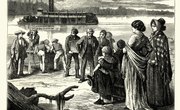Private security has been around practically since the beginning of civilization. In the Anglo-Saxon period, crime prevention and law enforcement were a community responsibility. Community involvement in apprehending criminals gave birth to the posse that we recall from the days of the Old West and is recognizable today when an individual makes a “citizen’s arrest.”
"Cave drawings and other evidence clearly demonstrate that protection and enforcement was a concern of early man,” according to John H. Christman, CPP, in his 2003 paper, titled “History of Private Security, Part 1."
In ancient Greece, a system of protection was developed to protect the monarchy as well as for the protection of highways leading into the cities. The Roman Empire developed the “12 tablets” (the first law book) outlining the laws for security and law enforcement. It was during this time that the praetorians came into being. The praetorians are historically known as the first police force.
ADT Security
ADT, which stands for American District Telegraph, had 57 affiliated offices around the country. ADT began as a messenger business, delivering telegrams in the 1800s. Business dwindled when more people began using the telephone. In 1901, ADT became a part of Western Union, which was later consumed by AT&T (American Telephone and Telegraph). ADT moved severed its ties to AT&T and later expanded into other areas--like burglar and fire alarms--in the period from 1910 to 1930. In 1964, ADT was accused of creating a monopoly since it provided almost 80 percent of the United States’ central station alarm services.
Brinks Home Security
Washington Perry Brink started a parcel transport service called Brink’s City Express in Chicago, Ill., in 1859. Probably one of the more recognizable names in the security company business, Brinks employs more than 48,000 people worldwide. It was Brinks that designed the first fully armored car from a school bus in 1927. In 1962, Brinks rolled out its air courier service. In 2009, Brinks Home Security changed its name to Broadview Security.
Wells Fargo
The name Wells Fargo conjures up visions of the Old West and the Pony Express, but Wells Fargo was actually started in Buffalo, N.Y., by Henry Wells and William George Fargo. In 1844, Wells Fargo was established and merged in 1850 with American Express (AE) when AE was a gold courier from New York to San Francisco. William Fargo became president of the American Express Company in 1868.
Pinkerton
Allan Pinkerton and attorney Edward Rucker, a Chicago attorney, formed the North-Western Police Agency in the 1850s. Later, the agency became The Pinkerton Agency. Pinkerton started out as a private detective with a zero tolerance policy. Pinkerton’s policy for himself and his agents was to accept no bribes, never compromise with criminals, turn down reward money and apprise clients of the status of their cases on an on-going basis. In 1871, the newly formed Department of Justice hired The Pinkerton National Detective Agency for the purpose of the detection and prosecution of those guilty of violating federal law. The association was short-lived with the passage of the Anti-Pinkerton Act of 1893, which no longer allowed private agencies to be employed by the government.
Wackenhut
Wackenhut is a relative newcomer in the security business. Founded in 1954 in Miami, Fla., Wackenhut Corporation was started by George R. Wackenhut, an FBI special agent. In 1964, Wackenhut Services Inc was formed specifically to handle the company’s government contract business. Notably, Wackenhut began Job Corps Centers in 1985.
In the 1990s, Wackenhut entered the private corrections industry offering cost-effective rehabilitation services for prison inmates. In a study conducted by the Florida Corrections Commission in 1996, it was determined that privatization was the most cost-effective way to handle rising prison demands.
Related Articles
References
Resources
Writer Bio
Formerly a teacher and consultant on computer operations and software applications for business schools, Andrea Carson is the owner and publisher of "Seniors of Las Vegas (SoLV)," a free magazine that deals strictly with issues involving senior citizens. Carson has a varied background that includes administrating nursing services, ad development, writing novels and screenplays and ghostwriting.










